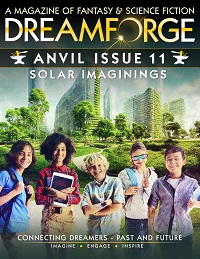 DreamForge Anvil #11, Spring 2023
DreamForge Anvil #11, Spring 2023
“Three Postcards from Another Earth” by Shanna Yetman
“Another Day on the Orbital Ranch” by David Hankins
“A Bowl of Soup on the 87th Floor” by Kai Holmwood
“Petrichor” by Richard A. Shury
“Like Stars Daring to Shine” by Somto Ihezue (reprint, not reviewed)
“Lost in Intuition” by Amara Mesnik
“The Jewel of the Waves, the Diadem of the Sky” by Jared Oliver Adams
Reviewed by Victoria Silverwolf
This special issue features the kind of optimistic, ecologically focused, near future science fiction sometimes known as solarpunk or hopepunk. Without denying that people in the future will face serious problems, both personal and environmental, this branch of speculative writing suggests that they will be able to deal with these challenges effectively.
“Three Postcards from Another Earth” by Shanna Yetman is a very brief piece with the structure indicated in the title. This trio of short messages describes a future in which chemicals are released into the atmosphere to reverse global warming. More of a vignette than a fully developed story, the most memorable aspect of this tiny work is the way in which the writers of the postcards find beauty in the altered sky.
The protagonist of “Another Day on the Orbital Ranch” by David Hankins works as the operations chief of a cattle farm in a space station. He has to deal with an infestation of rats, as well as a hostile stepdaughter and a failing marriage.
This brief synopsis may suggest a serious story, but in fact there is a great deal of humor in the narrative, from a wisecracking artificial intelligence to pure slapstick. The characters are likable, and the plot raises the question of whether an AI should be considered a human being without being preachy. The premise of raising cows in orbit, even given a future Earth running out of room for pastures, is very hard to believe.
An older woman runs a restaurant that serves only one item each day in “A Bowl of Soup on the 87th Floor” by Kai Holmwood. She lives and works in an enormous, high-tech building. Outside, people labor to heal a damaged environment. A visit from a young woman leads to the possibility of restoring a species thought to be extinct, as well as to a close relationship between the two characters.
This is a very pleasant story with a great deal of charm. Perhaps its most enjoyable aspect is the inclusion of detailed, mouthwatering descriptions of several different vegetarian soups. Some readers may find it overly sentimental, but as the author’s first published work of fiction it shows great promise.
Just slightly over one page in length, “Petrichor” by Richard A. Stuart features an automated device that places seeds and nutrients into the soil during one of the rare rains in an otherwise arid region. There is no real plot, just an evocative description of the machine and the landscape. The author wisely avoids anthropomorphizing the device.
In “Lost in Intuition” by Amara Mesnik, a woman returns to her native suburb after breaking up with a man in the big city. She embarks on a routine trip to purchase a new phone, but the AI operating the car in which she rides takes her other places, where she restores old relationships.
Although not humorous, the story has the feeling of a romantic comedy, in which the protagonist heals a broken heart, draws closer to family members, and is about to find true love with an old flame. The AI serves as the wise and sympathetic friend in such a plot. This is not meant to belittle the work, which gracefully succeeds at what it sets out to do. Once again, we have a tale verging on sentimentality from a first-time author who shows great talent.
“The Jewel of the Waves, the Diadem of the Sky” by Jared Oliver Adams takes place in a high-tech version of future India. The main character is a law enforcement officer. She investigates the case of a woman who disappeared after she deactivated the neural implant that allows her to communicate with the rest of society, but also allows her movements to be tracked. The protagonist uncovers the missing woman’s motive, and deals with it in an unexpected way.
The author creates a complex and believable future society. Although utopian in some ways, with great care taken of the environment, it also contains overcrowded slums and a rash of suicides. The story strikes a balance between the grittiness of cyberpunk and the optimism of hopepunk.
The protagonist is an intriguing, three-dimensional character, combining a certain amount of cynicism with devotion to duty. Although she is a devout Muslim who thinks of Hindus as heathens, she is able to work successfully with a Hindu from a rival agency. The story works both as an example of futuristic police procedure as well as an inspirational account of someone undertaking a personal journey of great importance against overwhelming odds.
Victoria Silverwolf notes that this issue also contains an article about the recent voyage of the unmanned spacecraft Artemis I around the Moon, written by an engineer who worked on the vessel’s trajectory.